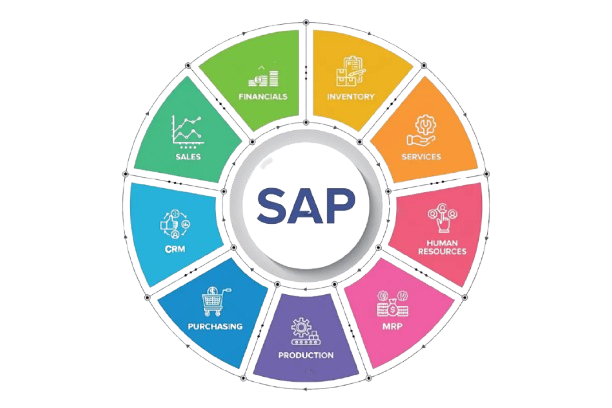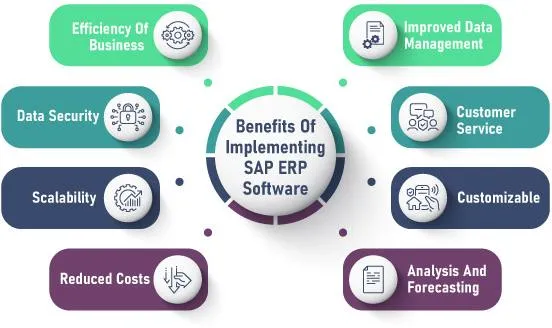The world widely recognises SAP as the premier enterprise software company. A German company first introduced Systems, Applications, and Products in Data Processing (SAP) in June 1972 as a financial accounting provider for A-type, or large, businesses. Over time, it evolved to develop new platforms that support finance, supply chain management, HR, and other key functions. SAP has now advanced to the point where even small and medium-sized businesses are implementing it to improve their operations and achieve their goals. So, in this blog, we’ll discuss how the SAP training may assist professionals in leveraging their abilities and successfully handling SAP business management software.
SAP Training Course includes many functional modules, such as finance, human resources, and technical components of the system, which are necessary for the business’s efficiency development and easy management of operations, as well as adding value to the firm.

What exactly is SAP Training?
SAP training is an informative and certification program that helps individuals or professionals to learn and handle SAP SE’s business software. In an organisation, it helps in core business processes like finance, logistics, human resources and etc. The SAP curriculum covers very interesting and specific topics. The SAP modules like SAP S/4HANA, SAP MM, SAP SD, SAP FICO, SAP HR, which are customised for different user levels, from the end-user to consultants.. An SAP professional can be an SAP consultant, SAP developer, or SAP analyst; a system administrator can acquire any position in the organisation.
The SAP Training Covers:
- Functional Modules: This module focuses on specific business domains, including SAP S/4HANA for finance, SAP MM for materials management, and SAP SD for sales and distribution.
- Technical Modules: This module trains professionals and individuals on how to handle SAP as a software system, as well as database management, client administration, and system design
- SAP Architecture:This module covers three-tier architecture, with the essential components being the presentation layer, application layer, and database layer. Additionally, the Enterprise Architecture Framework (EAF) includes business architecture, solution architecture, methodology, and support..
- SAP ERP: This module encompasses all core business processes inside an organisation, including SAP FICO, SAP SD, SAP MM, SAP HR, SAP PP, and customer relationship management.
Types of SAP Training.
SAP Training Courses include the SAP FI/CO course for finance and accounting control, SAP Database Administration, SAP Business Intelligence, etc. SAP operation is a highly complex procedure that requires competent guidance and training to gain the maximum benefits. Depending upon the company’s needs and requirements, professionals should undergo proper training courses to enhance their skills and ability in handling the SAP software accurately.
Let us now explore the various SAP training options that are best suited to the demands of the organisation.
1. Technical SAP Training
Individuals and professionals can learn how to set up, administer, and configure SAP systems with this program. The course covers modules on system tools and system management activities.
SAP Solution Manager training teaches professionals how to manage the system landscape, monitor business processes, and handle software modifications. SAP NetWeaver training helps you learn SAP’s technology, as well as integration tools and development platforms.
2. Functional SAP Training:
The functional SAP training comprises modules like Finance, Human Resources, SAP Materials Management, SAP Human Capital Management, and Sales. The above training assists trainees in the company in managing the purchasing and storage of materials in the department.
The HR department assists with payroll and time monitoring, as well as helping professionals operate company operations smoothly by integrating work across departments, successfully managing important business sectors, and applying these tools to daily duties.
3. End User Training:
This training enables professionals to complete daily duties such as data entry, report generation, and business process management. Process training assists with procurement and order processing. Helps in report creation and reading. Finally, troubleshooting training can assist in resolving basic difficulties such as data entry errors or access concerns.
4. Industry-Specific Training:
This kind of SAP training focuses on industry-specific solutions and sectors such as the public sector, retail, utilities, healthcare, and manufacturing. SAP can be used in healthcare to collect patient information and handle invoicing. Used in industries for production, refining, and distribution.
Thus, SAP meets the unique requirements of the operations and needs of that industry by producing superior results.
5. Certification Training:
SAP certification training has three levels: Associate, Specialist, and Professional. Trainees will be able to manage business tasks using SAP software.
The SAP Customer Data Platform Certification helps you learn about customer data tools. It also contains SAP HANA 2.0 certification, which enhances the ability to configure and administer the HANA system.
The Significance of SAP Training for Organisations.

Everyone should implement SAP to promote organizational growth. Certification training has numerous advantages; therefore, organizations should use SAP software to get the benefits. SAP software can aid in a variety of ways, including real-time information sharing, which enhances company efficiency, reduces work time, and improves client relationships.
1. Increase Performance Efficiency of the Organisation
The software helps organizations conduct their daily duties successfully and improves business operations by simplifying tasks. Similarly, combining data into a single database allows for real-time data access, precise decision-making, and improved departmental communication.
2. Precise forecasting
SAP Forecasting assists in various types of forecasting planning, mainly in sales and financial, which helps organizations depend on their supply and demand planning process efficiently.
3. Secure data
Data security is critical in all organizations, and SAP can help achieve this. SAP employs a high-security system with the help of a new upgrade of encryption technology. And this data is extremely safe; no stranger or unauthorized person can gain access to it. Data will be delivered using various tools and methods, such as encrypted external key management. SAP ERP can help accomplish this goal.
4. Enhancement of skills
To effectively manage SAP software, organizations require skilled SAP specialists. SAP consultants can help you run your business successfully by implementing SAP interfaces and functions.
5. Greater employee productivity
Trained SAP personnel contribute to organizational growth and development by doing jobs accurately and quickly and by leveraging software capabilities efficiently.
6. Adaptability for updates and upgrades
SAP adds new features and provides regular upgrades. SAP specialists will be up-to-date on the latest functionality, allowing organizations to benefit from new software and be updated with new versions.
7. Reduced error rates and costs
The trained SAP user will make fewer errors in data input and processing, increasing the accuracy of information and lowering the need for remedial procedures, saving time and resources. One of the most significant advantages of SAP is its cost-effectiveness, as it provides true and real-time data.
Why choose Kodakco for SAP Training?

Kodakco is one of the best SAP-authorized training centers in India, an upskilling and certified consulting technology academy company. It has been named among the top three experts in SAP software solutions and corporate application services. The institute operates globally, with two corporate offices in Hyderabad and San Francisco. Furthermore, it has over 12 years of experience in the sector. The academy has trained over 12,000 professionals in SAP courses. It offers over 31 SAP courses and is regarded as one of the top options for SAP online training in India.
The program is aimed to be practical and prepare students to handle real-world situations.
Major highlights of the SAP Training
- The course duration is 44 hours, but this may vary based on the course.
- It offers two modes of learning: online and two-way interactive sessions.
- Well-trained experts and highly seasoned faculty.
- The SAP course curriculum is practical, providing you with real-world experience.
- 100% job aid.
- Provides 24/7 access to an excellent LMS system.
SAP Training Duration, Fees & Career Opportunities.
| Course | Duration | Fees | Career Opportunity |
| SAP FICO | 44-hrs | 34,500/- | SAP FICO Consultant or Analyst. |
| SAP HR | 44-hrs | 34,500/ | HR Officer, HR Recruiter, or HR Generalist. |
| SAP Basics | 44-hrs | 34,500/ | SAP Consultant, Business Analyst, or SAP Developer |
| SAP HANA | 44-hrs | 34,500/ | SAP Data Analyst, SAP Developer, SAP Project Manager. |
| SAP ABAP | 44-hrs | 34,500/ | SAP ABAP Developer, Business Analyst, and SAP Architect. |
| SAP MM | 44-hrs | 34,500/ | SAP Material Manager, Consultant, Purchase Executive. |
| SAP BO | 44-hrs | 34,500/ | Business Intelligence Analyst, BI Developer, or BI Architect. |
Conclusion
In the above blog, we learned or were aware of the diversity of SAP training, which is critical for the organization’s long-term growth and success. It is an excellent investment for the firm. An SAP-trained professional is well-versed in SAP technology and understands how to manage SAP software properly, such as business process automation and cloud computing. They are also aware of the various training formats, fees, and durations. It has been proven that SAP is an essential tool in the business world. To get the most out of SAP software, hire a skilled SAP employee who understands the organization’s objectives and requirements.
Recommended Reads
- SAP CRM Training: A Key to Business Success
- SAP MM Course Fees, Duration & Eligibility Explained
- How to Maximize Your SAP Training Experience?
- SAP Training and Certification: Boosting Your Career in Enterprise Management
- Top 10 Benefits of Taking an SAP BASIS Course
FAQ’s
Ans. Systems, Applications, and Products in data processing.
Ans. Almost all industries use SAP software, including retail, manufacturing, finance, healthcare, and telecommunications.
Ans. This module usually helps in managing all financial activities in an organization.
Ans. SAP MM (Material Management) and SAP SD (Sales and Distribution) are quite easy to learn.
Ans.SAP Business One is considered the most popular product.



What an insightful read! Your blog masterfully outlines how SAP training drives efficiency, security, and growth within organizations. Kudos for simplifying such a complex topic into clear actionable benefits!